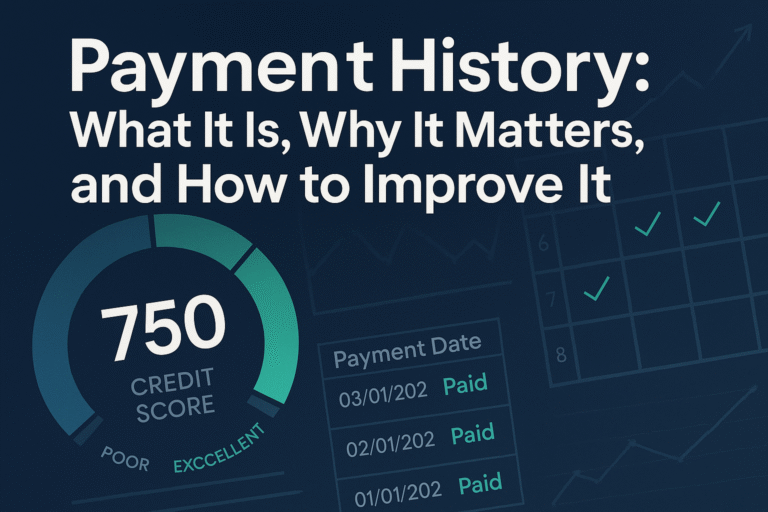Have you ever wondered why some people seem to build wealth effortlessly while others struggle despite earning a good income? The answer isn’t always about how much money you make; it’s about how you think about money. Your relationship with money is deeply rooted in psychology, shaped by childhood experiences, cultural beliefs, and emotional triggers that influence every financial decision you make. Understanding the psychology of money can be the difference between financial stress and financial freedom.
In this comprehensive guide, we’ll explore how your mindset shapes your wealth, uncover the hidden psychological barriers holding you back, and provide actionable strategies to rewire your money mindset for lasting prosperity.
Key Takeaways
Your money mindset is shaped by childhood experiences, cultural beliefs, and emotional patterns that influence every financial decision you make.
Scarcity mindset vs. abundance mindset: Understanding the difference can transform your relationship with wealth and open doors to new opportunities.
Common psychological money traps include loss aversion, present bias, and the sunk cost fallacy. Recognizing these patterns is the first step to overcoming them.
Emotional investing often leads to poor decisions; learning to manage fear and greed is essential for long-term wealth building.
Small, consistent behavioral changes, like automating savings and reframing money beliefs, can create significant financial transformation over time.
What Is the Psychology of Money?
The psychology of money refers to the emotional and mental patterns that influence how we earn, spend, save, and invest money. It’s not just about numbers on a spreadsheet; it’s about the stories we tell ourselves, the fears we carry, and the beliefs we’ve internalized about wealth and success. Investor.gov
According to behavioral economists like Daniel Kahneman and Richard Thaler, humans are far from rational when it comes to financial decisions. We’re influenced by cognitive biases, emotional triggers, and social pressures that often lead us astray from our financial goals.
Why Understanding Money Psychology Matters
Understanding the psychology of money is crucial because:
- It reveals blind spots: You can’t fix what you can’t see. Recognizing your money patterns helps you make better decisions.
- It reduces financial stress: When you understand why you make certain choices, you can create systems to support healthier habits.
- It improves investment outcomes: Emotional investing is one of the main reasons people lose money in the stock market. Learning to manage emotions leads to better returns.
- It builds lasting wealth: Wealth isn’t just about earning more; it’s about keeping what you earn and making it grow through smart, psychologically-informed decisions.
The Origins of Your Money Mindset
Your money mindset didn’t appear out of nowhere. It was carefully constructed over the years, starting from childhood and continuing through every financial experience you’ve had.
Childhood Money Messages
The foundation of your money psychology was laid in your earliest years. Did your parents argue about money? Did you grow up hearing phrases like “money doesn’t grow on trees” or “rich people are greedy”? These seemingly innocent comments become deeply embedded beliefs that shape your adult relationship with wealth.
Common childhood money messages include:
- “We can’t afford that” (scarcity mindset)
- “Money is the root of all evil” (negative association with wealth)
- “Save for a rainy day” (fear-based saving)
- “You have to work hard for money” (limiting belief about earning potential)
Cultural and Social Influences
Beyond family, your culture and social environment play a massive role in shaping your money psychology. Different cultures have varying attitudes toward wealth, debt, saving, and spending. In some cultures, talking about money is taboo; in others, it’s openly discussed and celebrated.
Social media has amplified these influences in recent years. The constant comparison to others’ highlight reels can create feelings of inadequacy and drive poor financial decisions based on “keeping up with the Joneses.”
Emotional Money Triggers
Certain emotions trigger specific money behaviors:
- Fear → Hoarding money or avoiding investments
- Shame → Hiding debt or avoiding financial planning
- Guilt → Overspending on others or self-sabotage
- Anxiety → Obsessive checking of accounts or paralysis by analysis
- Excitement → Impulse purchases or risky investments
Recognizing these emotional triggers is the first step toward developing a healthier money mindset.
Scarcity Mindset vs Abundance Mindset
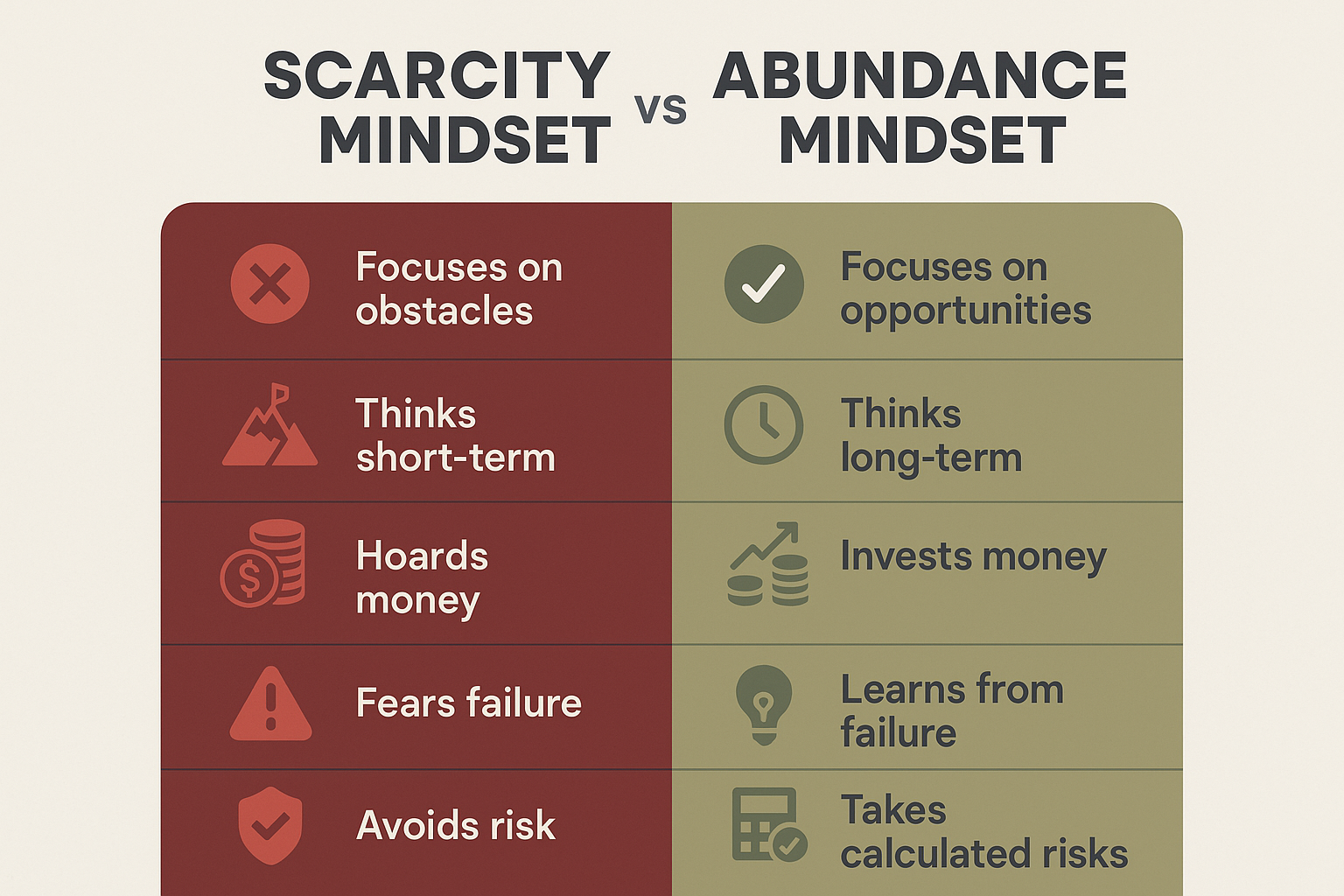
One of the most fundamental concepts in the psychology of money is the difference between scarcity and abundance thinking.
Scarcity Mindset: The Poverty Trap
A scarcity mindset operates from the belief that there’s never enough, not enough money, opportunities, or resources. People with this mindset often:
- ❌ Focus on what they lack rather than what they have
- ❌ Make fear-based financial decisions
- ❌ Hoard money instead of investing it
- ❌ See others’ success as a threat to their own
- ❌ Avoid taking calculated risks
This mindset creates a self-fulfilling prophecy. When you believe opportunities are limited, you’re less likely to pursue them, which reinforces the belief that opportunities don’t exist for you.
Abundance Mindset: The Wealth Magnet
An abundance mindset operates from the belief that there’s enough for everyone and that opportunities are plentiful. People with this mindset:
- ✅ Focus on possibilities and solutions
- ✅ Make growth-oriented financial decisions
- ✅ Invest in themselves and their future
- ✅ Celebrate others’ success and learn from it
- ✅ Take calculated risks with confidence
The abundance mindset doesn’t mean being unrealistic or reckless. It means approaching money with optimism, creativity, and a belief in your ability to create value and attract opportunities.
“The abundance mindset isn’t about having unlimited money, it’s about believing in unlimited possibilities for creating value and wealth.”
Common Psychological Money Traps
Even the most financially savvy individuals fall victim to psychological biases that sabotage their wealth-building efforts. Here are the most common traps and how to avoid them.
1. Loss Aversion: The Fear of Losing
Loss aversion is the tendency to feel the pain of losing money more intensely than the pleasure of gaining it. Research shows that losses feel about twice as painful as gains feel good.
This bias leads to:
- Holding onto losing investments too long
- Avoiding the stock market entirely
- Making overly conservative investment choices
- Selling winning investments too early
Solution: Understand that the stock market goes up over time despite short-term volatility. Create an investment strategy based on logic, not emotion, and stick to it during market downturns.
2. Present Bias: Instant Gratification
Present bias is our tendency to prioritize immediate rewards over future benefits. This is why it’s easier to spend $5 on coffee today than to invest that $5 for retirement 30 years from now.
This bias manifests as:
- Credit card debt from impulse purchases
- Insufficient retirement savings
- Choosing immediate consumption over long-term investing
- Difficulty delaying gratification
Solution: Automate your savings and investments so the money never reaches your checking account. Out of sight, out of mind. Learn more about smart ways to make passive income that work for you while you sleep.
3. Sunk Cost Fallacy: Throwing Good Money After Bad
The sunk cost fallacy occurs when you continue investing in something because of what you’ve already invested, even when it no longer makes sense.
Examples include:
- Staying in a failing business because you’ve already invested so much
- Holding onto a depreciating asset because you paid a lot for it
- Continuing an expensive subscription you don’t use
Solution: Make decisions based on future value, not past investment. Ask yourself: “If I were making this decision today from scratch, would I still choose this path?”
4. Confirmation Bias: Seeing What You Want to See
Confirmation bias is the tendency to seek out information that confirms your existing beliefs while ignoring contradictory evidence.
In investing, this leads to:
- Only reading news that supports your investment thesis
- Ignoring warning signs about a stock you love
- Dismissing expert advice that contradicts your view
Solution: Actively seek out opposing viewpoints. Play devil’s advocate with your own investment ideas. Diversify your information sources and be willing to change your mind when presented with new evidence.
5. Herd Mentality: Following the Crowd
Herd mentality is the tendency to follow what everyone else is doing, especially during market extremes. This is a major driver of the cycle of market emotions that causes investors to buy high and sell low.
This manifests as:
- Buying stocks when everyone’s euphoric (at market peaks)
- Selling stocks when everyone’s panicking (at market bottoms)
- Making investment decisions based on social media hype
Solution: Develop an independent investment strategy based on your goals and risk tolerance. When everyone is greedy, be cautious. When everyone is fearful, look for opportunities.
The Role of Emotions in Financial Decisions
Emotions are the invisible force behind most financial decisions. While we like to think we’re rational, our emotions often override logic, especially when money is involved.
Fear and Greed: The Twin Drivers
Fear and greed are the two dominant emotions in financial markets and personal finance.
Fear causes:
- Panic selling during market downturns
- Avoiding investments altogether
- Hoarding cash in low-interest accounts
- Missing opportunities for growth
Greed causes:
- Chasing hot stocks or get-rich-quick schemes
- Taking excessive risks
- Overleveraging with debt
- Ignoring warning signs
The key is finding balance. Successful investors learn to recognize these emotions and create systems that prevent emotional decision-making.
The Impact of Stress on Money Decisions
Financial stress literally changes how your brain works. When you’re stressed about money, your prefrontal cortex (responsible for rational thinking) becomes less active, while your amygdala (responsible for fear responses) becomes hyperactive.
This leads to:
- Poor decision-making under pressure
- Short-term thinking
- Avoidance behaviors
- Increased impulsivity
Managing financial stress:
- Practice mindfulness and stress-reduction techniques
- Create a clear financial plan to reduce uncertainty
- Talk about money openly with trusted advisors or partners
- Focus on what you can control, not market volatility
How Wealthy People Think Differently About Money
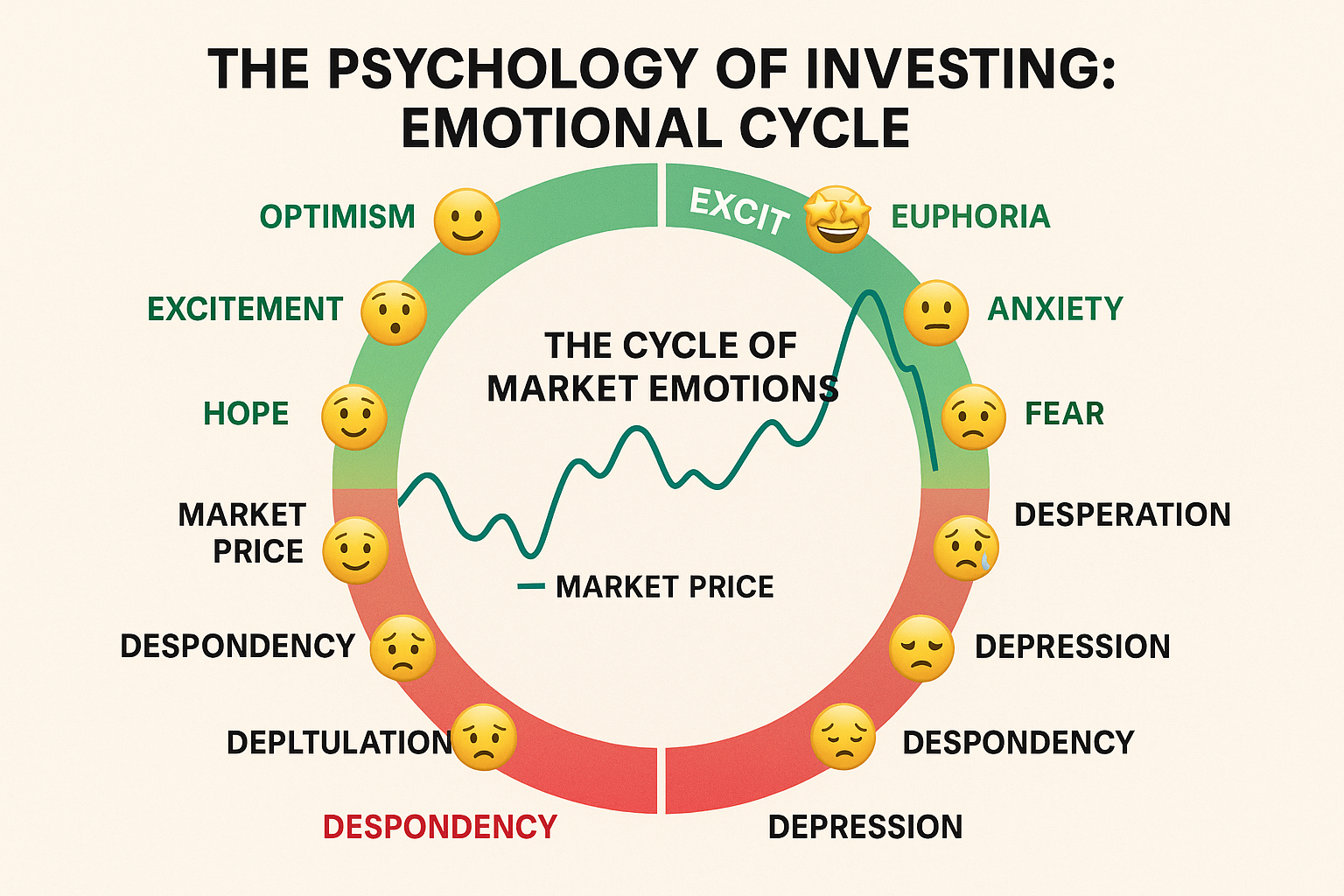
The psychology of money among wealthy individuals differs significantly from those struggling financially. These differences aren’t about intelligence; they’re about mindset and habits.
Wealthy Mindset Characteristics
| Wealthy Mindset | Poor Mindset |
|---|---|
| Focuses on opportunities | Focuses on obstacles |
| Thinks long-term | Thinks short-term |
| Invests in assets | Spends on liabilities |
| Sees money as a tool | Sees money as the goal |
| Learns from failures | Fears failure |
| Takes calculated risks | Avoids all risk |
| Builds multiple income streams | Relies on single income source |
| Continuous learning | Stops learning after school |
The Compound Effect of Small Decisions
Wealthy people understand that small, consistent decisions compound over time. A $5 daily coffee habit costs $1,825 per year, invested at 8% annual returns, which is over $100,000 in 20 years.
This isn’t about deprivation; it’s about awareness and intentionality. Every financial decision is a vote for the future you want to create.
Delayed Gratification and Future Self
The famous “marshmallow test” demonstrated that children who could delay gratification achieved better life outcomes. The same principle applies to money.
Wealthy people make sacrifices today for a better tomorrow. They:
- Max out retirement accounts before buying luxury items
- Live below their means to invest the difference
- Choose appreciating assets over depreciating purchases
- Understand that dividend investing creates passive income for their future self
Practical Strategies to Improve Your Money Mindset
Understanding the psychology of money is valuable, but transformation requires action. Here are proven strategies to rewire your money mindset and build lasting wealth.
1. Identify and Challenge Your Money Beliefs
Exercise: Write down your earliest money memories and the beliefs they created. Then challenge each belief:
- “Money is hard to earn.” → Is this always true? Are there easier ways to earn?
- “I’m bad with money.” → What evidence supports this? What contradicts it?
- “Investing is too risky.” → Compared to what? What’s the risk of not investing?
2. Create a Money Mantra
Replace negative money beliefs with positive affirmations:
- “I am capable of building wealth.”
- “Money flows to me easily and abundantly.”
- “I make smart financial decisions.”
- “I am worthy of financial success.”
Repeat these daily, especially when making financial decisions.
3. Automate Good Behavior
Remove willpower from the equation by automating:
- Savings: Set up automatic transfers to savings accounts
- Investing: Automate contributions to retirement accounts and brokerage accounts
- Bill payments: Eliminate late fees and decision fatigue
- Debt reduction: Schedule automatic extra payments
When good behavior is automatic, emotions can’t derail your progress.
4. Practice Gratitude and Abundance
Shift from scarcity to abundance by practicing gratitude:
- Keep a daily gratitude journal
- Appreciate what you already have
- Give generously (even small amounts)
- Celebrate small financial wins
Gratitude rewires your brain to notice abundance rather than lack.
5. Invest in Financial Education
Knowledge is the antidote to fear. The more you understand about money, investing, and wealth-building, the more confident you’ll become.
Resources to explore:
- Books: “The Psychology of Money” by Morgan Housel, “Thinking, Fast and Slow” by Daniel Kahneman
- Courses: Personal finance and investing courses
- Blogs: Regularly read educational content like TheRichGuyMath blog
- Podcasts: Financial education podcasts
6. Surround Yourself with the Right People
Your social circle significantly influences your money mindset. Surround yourself with people who:
- ✅ Have healthy relationships with money
- ✅ Support your financial goals
- ✅ Share knowledge and opportunities
- ✅ Challenge you to grow
Distance yourself from people who:
- ❌ Constantly complain about money
- ❌ Pressure you to overspend
- ❌ Discourage your financial ambitions
- ❌ Perpetuate scarcity thinking
7. Reframe Financial Setbacks
Everyone experiences financial setbacks. The difference is how you respond:
- Victim mindset: “This always happens to me. I’ll never get ahead.”
- Growth mindset: “What can I learn from this? How can I prevent it next time?”
View setbacks as tuition for your financial education, not evidence of your inadequacy.
8. Set Clear Financial Goals
Vague goals produce vague results. Get specific:
- “I want to be rich.”
- “I will accumulate $500,000 in investment assets by age 50”
Break big goals into smaller milestones and celebrate progress along the way. Understanding why you should invest helps clarify your long-term goals.
The Psychology of Investing: Managing Emotions in the Market
Investing is where the psychology of money becomes most visible and most costly if not managed properly.
Understanding Market Psychology
Markets are driven by collective human psychology. The cycle of market emotions shows how investor sentiment swings from optimism to euphoria to panic to despair and back again. Morningstar
The emotional cycle:
- Optimism: Market starts rising, investors feel hopeful
- Excitement: Gains accelerate, more people jump in
- Thrill: Portfolio at peak, feeling invincible
- Euphoria: Maximum risk-taking, “this time is different”
- Anxiety: First signs of decline, still holding on
- Denial: “It’s just a temporary dip.”
- Fear: Losses mounting, considering selling
- Desperation: “I need to get out now.”
- Panic: Selling at the bottom
- Capitulation: “I’ll never invest again.”
- Despondency: Market starts recovering, but too scared to participate
- Depression: Watching others profit while sitting in cash
- Hope: Cautiously optimistic
- Relief: Back in the market, the cycle repeats
Creating an Investment Philosophy
An investment philosophy is your North Star during market turbulence. It should include:
- Your time horizon: When will you need this money?
- Your risk tolerance: How much volatility can you stomach?
- Your investment approach: Active or passive? Growth or value?
- Your rebalancing strategy: When and how will you adjust?
Write this down and refer to it when emotions run high. Learning about high dividend stocks can be part of developing a stable, income-focused philosophy.
The Power of Dollar-Cost Averaging
Dollar-cost averaging (DCA) is the practice of investing a fixed amount regularly, regardless of market conditions. This strategy:
- ✅ Removes emotion from timing decisions
- ✅ Reduces the impact of volatility
- ✅ Builds discipline and consistency
- ✅ Takes advantage of market dips
Instead of trying to time the market (which even professionals can’t do consistently), DCA lets you participate in long-term market growth while managing psychological stress.
Avoiding Panic Selling
Panic selling during market downturns is one of the most destructive behaviors in investing. Here’s how to avoid it:
- Remember your why: Review your long-term goals
- Zoom out: Look at long-term charts, not daily fluctuations
- Focus on fundamentals: Has your investment thesis changed?
- Reframe losses: Temporary price drops aren’t losses unless you sell
- Disconnect: Stop checking your portfolio obsessively
The stock market has always recovered from downturns. Patience is rewarded.
Building Wealth Through Behavioral Change
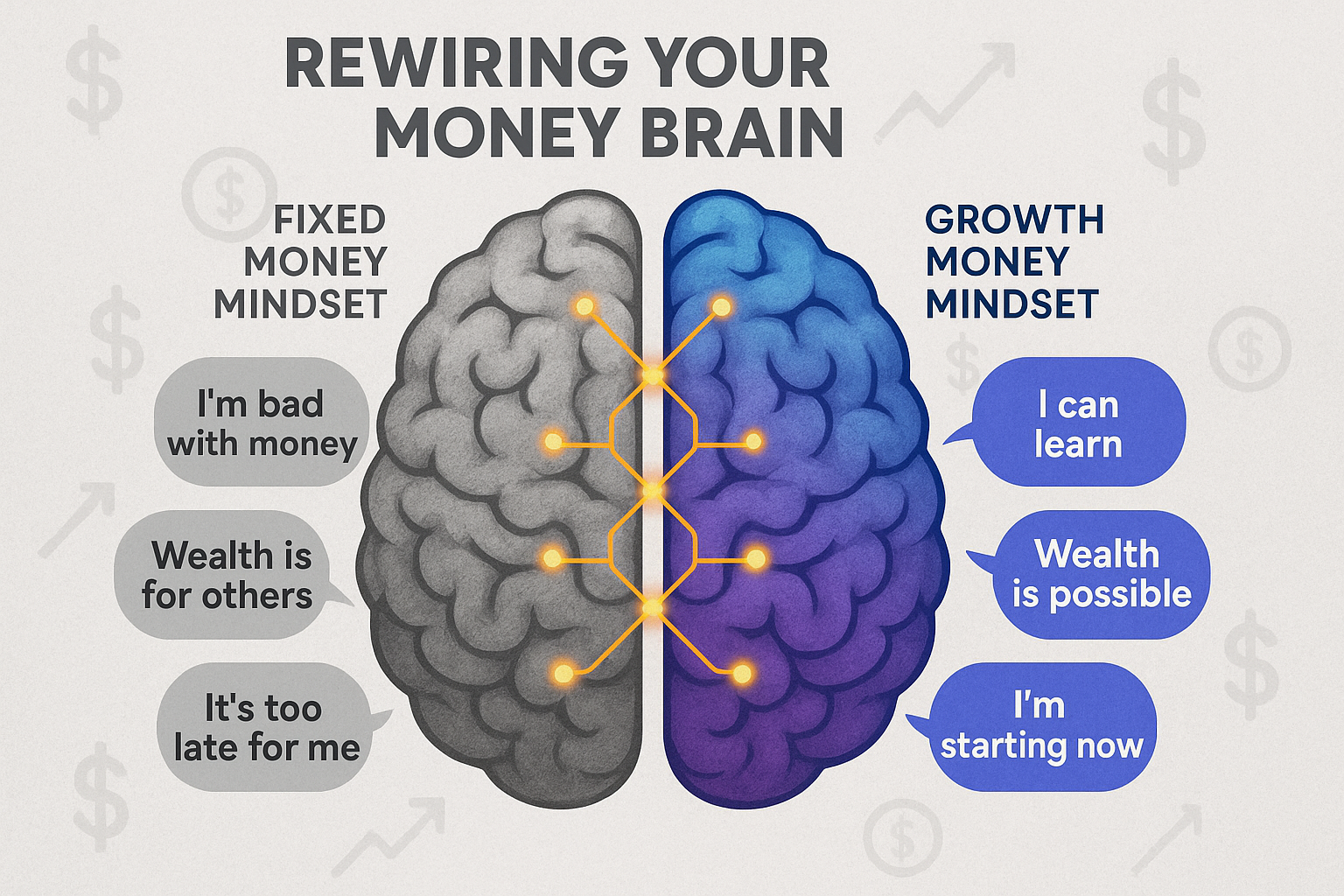
The psychology of money teaches us that wealth-building is more about behavior than intelligence or income level. Investopedia
The Power of Small Habits
James Clear’s “Atomic Habits” principle applies perfectly to money: 1% improvements compound into remarkable results.
Small money habits that create big wealth:
- Saving 1% more of your income each month
- Waiting 24 hours before non-essential purchases
- Reviewing your budget weekly instead of never
- Reading 10 pages of a financial book daily
- Using cash for discretionary spending to increase awareness
These tiny changes feel insignificant in the moment but create massive transformation over time.
The Two-Account System
Create psychological boundaries with a simple two-account system:
- Bills & Necessities Account: For fixed expenses and essentials
- Guilt-Free Spending Account: For discretionary purchases
This system eliminates the guilt around spending (if it’s in the spending account, you can spend it) while protecting your essential finances. Add a third account for savings and investments for even better results.
The 24-Hour Rule
Implement a 24-hour waiting period before any non-essential purchase over a certain amount (say, $50). This simple rule:
- Reduces impulse buying
- Allows emotions to settle
- Creates space for rational evaluation
- Often results in deciding you don’t need the item
Paying Yourself First
The “pay yourself first” principle means treating savings and investments as your first “bill” each month, not what’s left over after spending.
Traditional approach:
Income → Expenses → Savings (if anything’s left)
Wealthy approach:
Income → Savings/Investments → Expenses (with what remains)
This single shift in order can transform your financial future. Explore smart moves that successful investors make to build wealth systematically.
Real-Life Money Mindset Transformations
Sarah’s Story: From Scarcity to Abundance
Sarah grew up in a household where money was always tight. Her parents argued about finances constantly, and she internalized the belief that “money causes problems.”
As an adult, Sarah earned a good salary but found herself living paycheck to paycheck. She avoided looking at her bank account and felt anxious whenever money came up in conversation.
The turning point came when Sarah started therapy and identified her money trauma. She began:
- Journaling about her money beliefs
- Creating a budget without judgment
- Automating savings of just $25 per week
- Reading books about the psychology of money
- Celebrating small wins
Two years later, Sarah had $5,000 in emergency savings, started investing in her 401(k), and felt empowered rather than anxious about money. The key wasn’t earning more; it was changing her mindset.
Michael’s Story: Overcoming Loss Aversion
Michael lost $10,000 in the 2008 financial crisis and swore he’d never invest again. For 12 years, he kept all his money in a savings account earning less than 1% interest.
When a friend explained the concept of loss aversion and the long-term growth of the stock market, Michael realized his fear was costing him hundreds of thousands in potential gains.
His transformation:
- Started with a small investment of $100/month
- Committed to not checking his account for the first year
- Educated himself about market cycles and historical returns
- Gradually increased contributions as confidence grew
Five years later, Michael’s portfolio had grown significantly, and he deeply regretted the 12 years he sat on the sidelines. But he learned that it’s never too late to change your money psychology.
The Psychology of Money in Different Life Stages
Your money mindset needs to evolve throughout life. Here’s how the psychology of money applies at different stages:
Early Career (20s-30s)
Psychological challenges:
- FOMO (fear of missing out) on experiences
- Comparing yourself to peers
- Underestimating the power of compound interest
- Present bias (retirement feels far away)
Mindset shifts needed:
- Embrace delayed gratification
- Focus on your own journey, not others’
- Understand that time is your greatest asset
- Start investing now, even in small amounts
Mid-Career (40s-50s)
Psychological challenges:
- Lifestyle inflation as income increases
- Pressure to fund children’s education
- Anxiety about “catching up” if behind
- Balancing current enjoyment with future security
Mindset shifts needed:
- Resist lifestyle creep
- Prioritize your retirement over kids’ college (they can borrow for school; you can’t borrow for retirement)
- Focus on what you can control
- Make up for lost time with increased contributions
Pre-Retirement (50s-60s)
Psychological challenges:
- Fear of market volatility as retirement approaches
- Anxiety about having “enough”
- Regret about past decisions
- Uncertainty about the future
Mindset shifts needed:
- Create a clear retirement income plan
- Shift from accumulation to preservation mindset
- Practice self-compassion about past mistakes
- Focus on what you’ve accomplished, not what you lack
Retirement (60s+)
Psychological challenges:
- Fear of running out of money
- Difficulty shifting from saving to spending
- Identity loss without work
- Guilt about spending on yourself
Mindset shifts needed:
- Trust your plan and allow yourself to enjoy your money
- Reframe spending as the reward for decades of saving
- Find purpose beyond work
- Balance generosity with self-care
Common Questions About the Psychology of Money
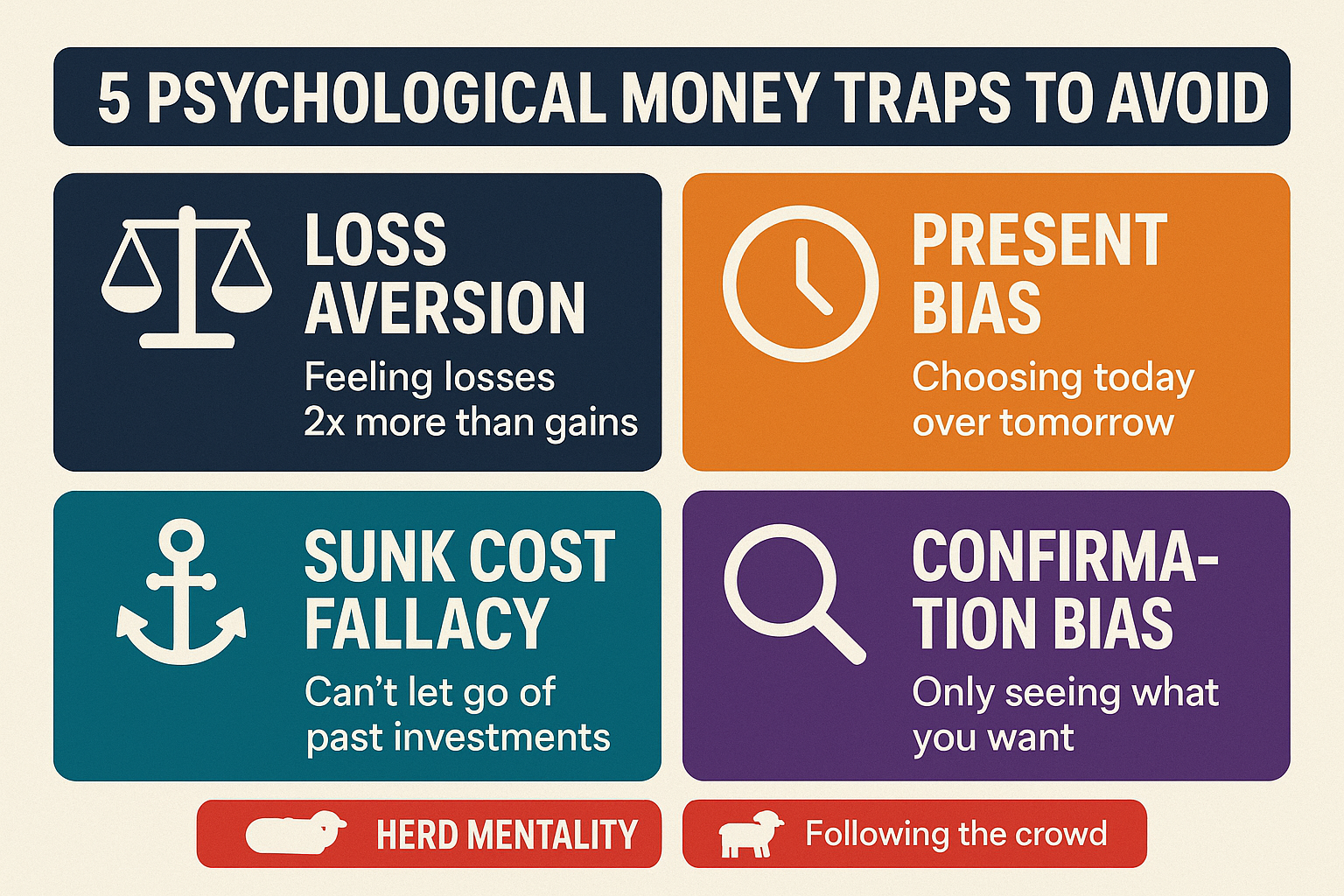
How long does it take to change your money mindset?
Changing your money mindset is a gradual process, not an overnight transformation. Research suggests it takes 66 days on average to form a new habit, but deep-seated money beliefs may take 6-12 months of consistent work to shift significantly.
The key is consistency and self-compassion. You’ll have setbacks, but each conscious choice to think differently about money strengthens new neural pathways.
Can you have a healthy money mindset without being wealthy?
Absolutely! A healthy money mindset isn’t about how much money you have; it’s about your relationship with money. You can have millions and still have a scarcity mindset (always fearing loss), or you can have modest means and an abundance mindset (grateful for what you have and confident in your ability to create more).
In fact, developing a healthy money mindset often precedes wealth creation, not the other way around.
How do I overcome money shame?
Money shame is incredibly common and deeply damaging. To overcome it:
- Acknowledge it: Name the shame and recognize it’s not serving you
- Challenge the narrative: Separate your worth from your net worth
- Share your story: Talk to trusted friends or a therapist
- Focus on progress: Celebrate every step forward, no matter how small
- Practice self-compassion: Everyone makes financial mistakes
Remember: your current financial situation is not your identity, and it’s not permanent.
Is it ever too late to change your money psychology?
It’s never too late! While starting earlier provides more time for compound interest to work its magic, changing your money mindset at any age can dramatically improve your financial situation and peace of mind.
Some of the most successful investors started late. What matters is starting now and remaining consistent
💰 Money Mindset Assessment
Discover whether you have a scarcity or abundance mindset
Your Money Mindset Score
Recommendations for Growth:
The psychology of money explores how human emotions, habits, and biases shape financial decisions. It’s about why people handle money the way they do—not just how. Understanding this helps you make smarter, calmer financial choices.
No. While Morgan Housel’s The Psychology of Money popularized the concept, the term also refers to the broader field of behavioral finance, which studies how psychology influences money management, investing, and saving habits.
Money decisions often trigger emotions like fear, greed, or envy. These emotions can cause people to buy high, sell low, or overspend. Learning to recognize and manage emotional triggers helps improve financial outcomes over time.
Some key money biases include:
Loss aversion – fearing losses more than valuing gains
Confirmation bias – seeking information that supports existing beliefs
Overconfidence bias – assuming your financial decisions are always right
Herd mentality – following the crowd without research
Understanding these helps you build a more objective investing mindset.
Track emotional triggers when spending or investing.
Focus on saving consistently, not perfectly.
Define what “enough” means for you.
Avoid comparing your financial journey to others.
Prioritize long-term patience over short-term excitement.
The key message is: how you behave matters more than how much you know. Wealth isn’t just about intelligence—it’s about patience, humility, and emotional control in financial decisions.
Conclusion: Your Money Mindset Is Your Financial Foundation
The psychology of money reveals a profound truth: wealth is built from the inside out. Your bank account is a reflection of your mindset, beliefs, and behavioral patterns around money. Change your psychology, and you change your financial trajectory.
The journey from scarcity to abundance thinking isn’t always easy. It requires confronting uncomfortable truths, challenging deeply held beliefs, and consistently choosing new behaviors even when emotions pull you in the opposite direction. But the rewards are immeasurable: financial peace, increased wealth, and the freedom to live life on your terms.
Remember these key principles as you move forward:
Start where you are: You don’t need to completely transform overnight. Small, consistent changes compound into massive results.
Practice self-compassion: Everyone has money baggage. Your past financial mistakes don’t define your future potential.
Invest in education: The more you learn about money, the less scary it becomes. Knowledge truly is power in personal finance.
Create systems, not resolutions: Automate good behavior so emotions can’t derail your progress.
Think long-term: Wealth-building is a marathon, not a sprint. Patience and consistency win.
Your Next Steps
Ready to transform your money mindset? Here’s your action plan:
This week:
- Complete the money mindset assessment above
- Journal about your earliest money memories
- Identify one limiting belief to challenge
This month:
- Read one book about the psychology of money
- Automate at least one financial good habit
- Have an honest conversation about money with someone you trust
This year:
- Set clear financial goals with specific timelines
- Build an emergency fund of 3-6 months’ expenses
- Start investing, even if it’s just $25 per month
- Review and adjust your money mindset quarterly
The psychology of money teaches us that wealth isn’t just about what you know, it’s about who you become. Every financial decision is an opportunity to reinforce your new, empowered money mindset.
Your financial transformation starts not in your wallet, but in your mind. Choose abundance. Choose growth. Choose to believe that you are worthy of wealth and capable of creating it.
The question isn’t whether you can change your financial future. The question is: are you ready to start today?
Disclaimer
The information provided in this article is for educational purposes only and should not be considered financial advice. Every individual’s financial situation is unique, and what works for one person may not be appropriate for another. Before making any significant financial decisions, please consult with a qualified financial advisor, accountant, or other professional who can assess your specific circumstances. Past performance does not guarantee future results, and all investments carry risk, including the potential loss of principal. The author and TheRichGuyMath.com are not responsible for any financial decisions made based on the information in this article.
About the Author
Max Fonji is a financial educator and wealth psychology specialist with over 15 years of experience helping individuals transform their relationship with money. After overcoming his own limiting money beliefs and building significant wealth, Max dedicated his career to teaching others the psychological principles that separate financial strugglers from wealth builders.
Max holds certifications in behavioral finance and has studied under leading experts in the psychology of money. He believes that financial education should be accessible to everyone, regardless of their starting point, and that mindset is the most underrated factor in wealth creation.
When he’s not writing about finance, Max enjoys hiking, reading behavioral economics research, and mentoring young investors through community programs. He lives by his personal motto: “Your mindset is your greatest asset, invest in it wisely.”
Connect with Max and explore more wealth-building strategies at TheRichGuyMath.com.




